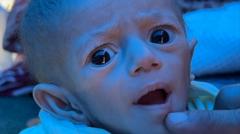In Gaza, the conditions are dire, and the struggles faced by families, especially children, starkly illustrate the human cost of ongoing conflict and blockades. Recently, BBC News reported on a five-month-old baby, Siwar Ashour, whose fragile health has become a symbol of the growing humanitarian crisis in the region.
Walking past the ruins of former homes and makeshift shelters, it is evident that the resilience of Gaza's residents is under tremendous strain. Local camera operators document not only the physical destruction but also the emotional toll on the children, who seem numbed by the violence around them. For many, like Siwar, mere survival is a daily battle, as families queue for scant food and assistance or go without entirely.
Recently discharged from Nasser hospital, Siwar weighs a mere 2 kilograms, well below the healthy weight for her age. Due to an allergic reaction, she is reliant on a specialized formula, which is now in critically short supply due to the blockade on humanitarian assistance. Her mother, Najwa, reported to a local reporter how the limited formula she was given is already running out, exacerbating her daughter's declining health.
Najwa and her mother, Reem, live together in a cramped one-bedroom shack, where they confront not only the anxiety of imminent bombings and gunfire but also their own malnutrition. The realities of war have rendered Najwa unable to breastfeed, as mothers struggle to find enough food themselves, a situation echoed among many families in Gaza.
The Israeli military maintains that there is no food shortage, a claim rejected by various humanitarian organizations, foreign governments, and even some nations' leaders. The contrast between these claims and the testimonies from those on the ground, including Najwa's heartbreaking narrative, highlights the disconnect between governmental narratives and lived experiences.
As aid organizations persistently advocate for increased assistance, the suffering of over 2 million residents in Gaza seems to persist unchanged. The ongoing conflict has left them grappling with limited resources while living under constant threat—a reality that echoes the sentiments of many mothers like Najwa, who simply wish to focus on the present moment and the survival of their children in an unforgiving environment.
As the report concludes, the pressing issues of food scarcity, lack of medical supplies, and overall safety present an urgent call for empathy and action as the world looks on.


















